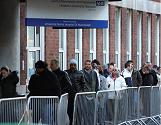Lessons from history show self-regulation to be the best kind of control
SUGGESTED



In their election document, the country’s Catholic bishops – who are not known for their support of free market economics – pointed out: “A society that is held together just by compliance to rules is inherently fragile, open to further abuses which will be met by a further expansion of regulation.”
It seems that this is precisely the trap into which the UK government has fallen with regard to financial regulation.
The minister in charge of financial regulation is Mark Hoban – who was, at one time, a devotee of free market economics. But, before the election he said he wanted a much more intrusive regulatory regime by the Bank of England.
Every scandal or crisis in financial markets yields a response of more bureaucratic regulation and more boxes to tick. The consequences are increased costs, poorer regulation and reduced competition…
Read the rest of the article in The Daily Telegraph.
1 thought on “Lessons from history show self-regulation to be the best kind of control”
Comments are closed.




I think the British Empire was the ultimate in self regulation that really succeeded. Of course there were individual atrocities like the slave trade which we all too readily to change. However if you read Professor Kennedy’s book The Fall And Rise Of The Great Powers, Britain’s economic hegemony over the world was complete ruling 20% of the world’s population and manufacturing 66% of the world’s goods.
Niall Ferguson’s book Empire praises Britain’s export of capitalism, democracy and Christianity. What was our governments’s role? The odd law, Governor and a navy to keep the trade routes open. We uniquely as a world power did not start one major military conflict 1815 -1914.